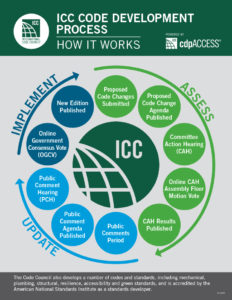It’s been one year, eight months, 28 days since proposals were due into the International Code Council’s (ICC) system for consideration into the 2021 International Energy Conservation Code (IECC). That doesn’t include the time proponents spent considering and drafting proposals for submission. In all, the code efficiency was increased by at least 10%, but the final disposition of the 2021 IECC was only just concluded on Oct. 8. So after all this time, why are we still talking about this next version of the code?
Typically, a code development cycle follows a predictable schedule. But the 2021 Energy Conservation Code took a diversion between the online governmental consensus vote (OGCV) and New Edition Published. If you’ve been following along with NBI through this process, you’ve seen our past blogs on challenges (3/12/20) and appeals (7/28/20) that were filed by opponents following the results of the OGCV. This backlash to the results of the outcome of the online vote has been fierce and unprecedented. ICC staff grouped attacks from multiple parties into three categories: (1) Federal Preemption, (2) Scope and Intent, and (3) Impact of Online Voting, Cost Impact, Voting Guides, Voter Eligibility, Validation Process.
Federal Preemption
Proposals covered: RE107, RE126
Proposals RE107 and RE126 would require systems using gas to not contain continuously burning pilot lights and require more from residential water heating systems.
Preemption is the term used to describe the invalidation of a code provision (or other policy) that conflicts with U.S. federal law. Preemption  limits the authority of states or other jurisdictions from creating more stringent standards on certain types of appliances than those set by the federal standard. The Appeals Board correctly conveyed that the Federal Preemption appeal was not within the scope of their authority, which is limited to violations of process or procedure.
limits the authority of states or other jurisdictions from creating more stringent standards on certain types of appliances than those set by the federal standard. The Appeals Board correctly conveyed that the Federal Preemption appeal was not within the scope of their authority, which is limited to violations of process or procedure.
What is concerning here is the ICC Board of Directors then decided to sustain the appeal and exclude these two proposals in the 2021 IECC because they are “potentially preempted.” It is important to remember that appeals like this have already been decided by federal courts, and not in favor of appellants. The ICC Board has stepped outside of their area of expertise by acting as an expert in federal law, and improperly removed these two code proposals from being published in the next IECC, overturning these proposals that were voted into the code by governmental voters.
Scope and Intent
Proposals covered: RE147, CE217 Parts I and II
Proposals RE147 and CE217 would have required new homes to include an electrical outlet near a gas-fired mechanical equipment (for ease in future equipment replacement) and garages and electrical systems to be readied for Electric Vehicle charging.
The Appeals Board, ICC staff and appellants have outrightly dismissed the full scope and intent of the IECC, by claiming that these updates do not meet the stated intent of the model code to conserve energy, and instead picked and chose the words that supported their argument. The Appeals Board recommendation has been wrongly decided and is in direct conflict with statements from the Commercial Code Development Committee in Albuquerque last year – where during discussion about a proposal to modify the intent language to include “time of use” (a related issue), the Committee stated that “time of use” was already presumed within the intent via the wording “effective use” of energy.
The ICC Board decision to sustain the appeal, thereby overturning the governmental vote and wrongly assuming that voters had not already taken these issues into account serves as a dangerous precedent for defining what “effective use” of energy means, and threatens any future proposals where voters both understand and agree with a broader interpretation of “effective use” or any other provision of the code.
Impact of Online Voting
Proposals covered: RE21, RE29, RE32, RE33, RE36, RE37, RE126, RE145, RE147, RE151, RE182, RE184, RE192, RE204, RE209, CE12, CE49, CE56, and CE262
These proposals cover many code updates that directly impact efficiency of the building systems in both residential and commercial construction.
The Appeals Board recommended the ICC Board deny these appeals and uphold the outcome of the online governmental consensus vote. The Board did just that, preserving thousands of votes cast by governmental members who turned out to participate in this development cycle.
Most concerning in this appeal were the multiple attacks on the right to vote and voter intimidation tactics. Time and again, appellants stated during appeals hearings that ICC’s allowance of voters this cycle were analogous to allowing “dog-catchers” to vote…
Most concerning in this appeal were the multiple attacks on the right to vote and voter intimidation tactics. Time and again, appellants stated during appeals hearings that ICC’s allowance of voters this cycle were analogous to allowing “dog-catchers” to vote; never stating that one did, but rather using it as a pretense to devalue the knowledge and expertise of new GMVRs. Additional attacks were lobbed at cities who decided to participate, most notably by issuing Freedom of Information Act (FOIA) requests to voting cities for massive numbers of documents, placing further burden on cities that participated to respond to such requests.
ICC has stated “Participation in the Online Governmental Consensus Vote is the best way to ensure the Code Council family of codes reflects the needs of the communities represented.” This year, and as a clear sign of heightened interest in having the IECC reflect the need of reducing energy used in buildings, voter participation increased and fulfilled the intent of establishing online voting in the first place. We hope that the voter intimidation does not dissuade any GMVR from future participation.
Next Steps for the 2021 IECC
As we work to change the way our buildings are constructed and renovated to meet our health, equity and climate goals, there will be dissenters. The market laggards who want to do things the “way they always have before” will continue to push back on proposals that future proof our buildings and homes, and try to limit who is allowed to participate in the process to create the laws and regulations used by cities and states that are compelled to change.
Aversion to change is not a reason to hold back progress. Cities and states across the country are asking for a model energy code that will help them meet their climate goals, and that is the potential of the 2021 IECC. This model energy code will be the first that is off-the-shelf ready to be adopted as a net-zero construction code by jurisdictions for new commercial and residential buildings (zero energy appendices were adopted into the final version for both sectors).
By further dices covering solar and , and using the vetted and off-the-shelf ready language around electrification and EVs (from RE147, CE217 Parts I and II) jurisdictions can even use the code to go beyond energy and help meet their carbon reduction goals. These buildings would be grid-friendly and ready to interact at times of peak demand to reduce the carbon impact of electricity generation.
We haven’t stopped our work on the IECC. NBI has partnered with Natural Resources Defense Council to develop a Decarbonization Code (ETA January 2021) that when adopted with the 2021 IECC, will help jurisdictions achieve all electric, net zero buildings in new construction. Our team continues to support questions and outreach from jurisdictions that want to move beyond what the ICC process is offering.
And, you’ll be hearing from us again as we dive into the development of the 2024 IECC!
by Kim Cheslak, Director of Codes
Bio
